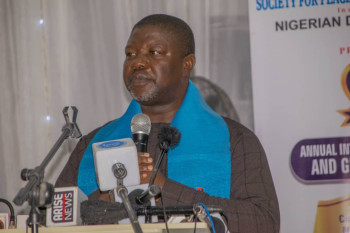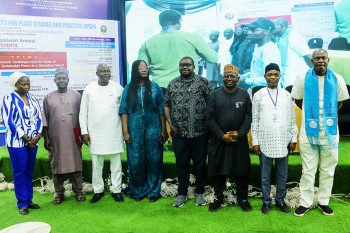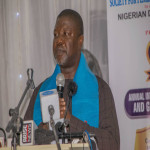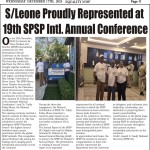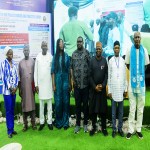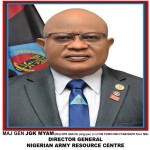A PRESENTATION ON THE WAY FORWARD FOR SOCIETY FOR PEACE STUDIES AND PRACTICE (SPSP) PRESENTED BY THE PRESIDENT, NATHANIEL MSEN AWUAPILA, FSPSP, DURING THE VIRTUAL INDUCTION CEREMONY ORGANISED FOR THE NEW NATIONAL EXECUTIVE VIA ZOOM, ON JANUARY 11, 2023
SOCIETY FOR PEACE STUDIES AND PRACTICE: KEY PRIORITIES FOR 2023-2025
Vision statement
The emergence of a professional platform for synergic relationship focused on sustainable peace and development [in Africa].
Mission statement
Building and strengthening the capacity of scholars, practitioners, and others for qualitative service delivery in peace and development work.
Aim of this Administration
Strengthened internal systems to enable SPSP to deliver optimally on her mandate as a regulatory professional body.
Policy and Principle of this Administration
The Constitution of the Society for Peace Studies and Practice (SPSP) anticipates a united focus toward the attainment of a full regulatory status for the Society. This Administration will be driven on the basis of that policy and principle as adopted by the founding fathers of the Society and enshrined in the Constitution. The Constitution declares as follows: “the Society shall essentially operate as a regulatory professional body for the promotion of Peace Studies and Practice in Nigeria” (Art. 1.7[2]). This Administration shall strive to fulfill in full this key constitutional expectation including by utilizing every available opportunity provided by enabling legislation to exercise the regulatory status.
Highlights
1. This document sets out the key priorities for the administration of Society for Peace Studies and Practice (SPSP) for the period 2023 - 2025.
2. The priorities will be executed based on scientific and standard approaches for managing non-profit entities. During the first year of this Administration we must aim to achieve remarkable Institutional Strengthening. To achieve this, we must also regularly fulfill all obligations toward the regulatory authorities. This practice must begin immediately and be sustained continuously.
3. During the period of 2012-2016 a consciousness about the need to move from Activity Based planning to Strategic Planning was introduced in the Society. We need to implement that consciousness in full during this tenure. Therefore, this administration will strive to develop and implement, for the first time, a Strategic Plan for SPSP during the first 150 days of this Administration effective from the date of full hand-over.
4. In order to be in a position to create high impact in the field of peacebuilding, SPSP must seek to win the trust and confidence of all key stakeholders working in the field. That includes some of the leading donor agencies and the major implementing Partners (IPs) who execute the decisions of the donor community. Winning the trust and confidence of donors and IPs will be an important priority for this Administration, which we can achieve by striving to fulfill all partnership conditions established by the agencies that support peace work globally. This will be on the first-line order of this Administration throughout our tenure.
5. For a Society such as SPSP, it is not sufficient to positively impact members of the Society and beneficiaries of institutional member-organizations. We should apply our unique advantage to impact the key actors that determine how peacebuilding practice is directed, funded, and reported in the areas where we work. Those key actors are always found within and with leading institutions and multilateral bodies such as the United Nations System, the African Union and the ECOWAS system, etc. These key actors have traditionally harvested ideas on the floors of these multilateral bodies during their General Assemblies and Consultative engagements. Therefore, this Administration will harvest from the vast, almost limitless, wealth of expertise and experience and array of scientific publications that SPSP can boast of, and we will utilise these to impact and influence global peace practice and peace initiatives on the Continent. This will be possible by gaining membership of key platforms within the UN system, the AU system and the ECOWAS system, particularly the ECOSOC Consultative Forum of the UN and the ECOSOCC Consultative Forum of the AU. We will also utilize opportunities to form viable partnerships with ECOWAS and similar bodies. By the second year of this Administration we would have achieved or made significant progress on achieving consultative status with the UN System and the AU as well as formalized relationship with the ECOWAS system. These attainments are possible after we have fulfilled all obligations spelt out in paragraph 2 above and must include the requirement to publish annual reports and meet any further specific standards.
6. To achieve the expectations in paragraph 2 above, we must also ensure to have in place adequate internal control systems, relevant policies and standard operating procedures (SOPs) to guide all institutional operations and relationships with members, donors and partners. We must have institutional guidance for ensuring Accountability and Compliance in all internal operations including matters touching on the management and reporting on organizational resources.
7. As has become the standard practice internationally, we must also have in place adequate policies and procedures to regulate ethical conduct, safety (safeguarding) and protection standards for persons coming in contact with the Society or it's representatives. In the environment where SPSP operates, which is characterized by exposure to multiple risks of fraud, personal and collective protection and safety concerns, all serious-minded organizations have in recent years demonstrated due diligence and duty of care by ensuring to have in place a minimum set of policies, guidelines and standard practices. This Administration will aspire to place SPSP in the highest category of compliant organizations.
8. An ever present mesh of risks and threats characterize the experience of organisations that embrace and thrive on collaborative interventions. All through the years, SPSP as an institution has valued and promoted or embraced partnerships, as the Society also has provision for institutional memberships that embraced academic institutions, non-governmental organizations, state governments, Federal Government agencies, etc. This, therefore, calls attention to the need to review our partnership practices and have in place a policy or policies that will regulate all of SPSP’s partnership activities with collaborating agencies.
Priority Areas
1. Behaviour of SPSP toward regulatory authorities.
2. Adequacy of institutional policies, procedures, and standards regarding matters of administration, institutional operations, and donor requirements.
3. Adequacy of policies and procedures regarding ethical conduct, safety (safeguarding) and protection standards for persons coming in contact with the Society or it's representatives.
4. Adequacy of practices for ensuring Accountability and Compliance in all internal operations.
5. Adequacy of system for managing and reporting on donations, grants, membership dues/fees, voluntary contributions, other incomes.
6. Adequate framework and guidance on matters of partnership formation and partnership management with collaborating agencies.
7. Increase the impact of SPSP research initiatives and publications through deliberate marketing strategies.
8. Strengthen organs of SPSP viz: SPSP Fellows Platform to serve as a Think Tank.
9. Review and strengthening of members’ roles in internal decision-making processes and strategic policy influencing initiatives.
10. Strengthening of Programme and Project Management capability at national and state levels.
11. SPSP Branch development in-country and preparation toward establishment of Branches outside of Nigeria.
12. Membership administration including Individual and Institutional Membership, members in-country and members in the diaspora; membership progression criteria, Fellowship Award policy, Special Awards.
13. Increase the impact of information dissemination, policy influencing and publicity practices of SPSP.
14. Review and strengthening of SPSP Procurement System.
15. Develop an Employment Policy to address employment procedures for full-time staff, part-time staff, consultants, contractors, facilitators, other service providers.
16. Fully activate IIPRP and enable it fulfill its mandate as approved by the Federal Government of Nigeria.
17. To deliver on the proposed, hinge key actions on strategies, approaches and methods including: Strategic planning, Strict professionalism, Policy effectiveness, Continuous fundraising, Effective use of ICT, etc.
Conclusion
This presentation seeks to assure our Founder, Board of Trustees of which the Chairman and our Founder are in the class of the best minds in this area, all Fellows, State Executives, and members that we understand what they look forward to seeing SPSP become in the near future. To achieve even the least of the steps that we highlighted above, a lot of financial and other resources are required. We will present every situation to our BOT and the General Congress at every available opportunity and trust that nothing short of their full support will be guaranteed.
Thank you.
Nathaniel Msen Awuapila, fspsp
President, Society for Peace Studies and Practice
January 11, 2023
